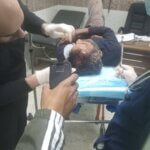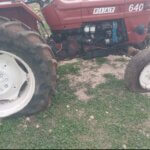Solidarity work day in Fasayil al Wusta
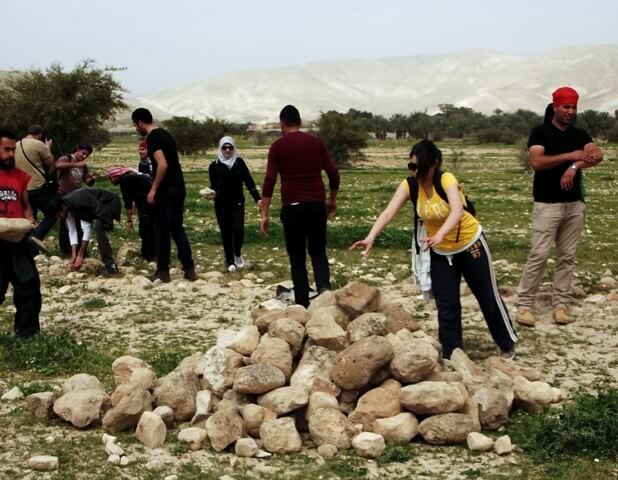 Young Palestinians from Ramallah, Nablus and Hebron spent 8th March 2013 working in solidarity with the community of Fasayil al Wusta, which has been subjected to successive waves of demolitions over the last two years.
Young Palestinians from Ramallah, Nablus and Hebron spent 8th March 2013 working in solidarity with the community of Fasayil al Wusta, which has been subjected to successive waves of demolitions over the last two years.
There were about 100 young people in total, from the Tejwal group, who spent the day helping to build a mud brick house and community centre for the village. The day started and ended with information sessions about the situation in the Jordan Valley, and specifically in Fasayil al Wusta, where large settlements (Tomer and Petza’el) have been created on either side of the village gradually pushing Palestinian families out of the area as they expand and take more land.
One of the group wrote about the day:
“Today we needed to collect stones to reinforce the community house and to make a cement floor in the mud brick house.”
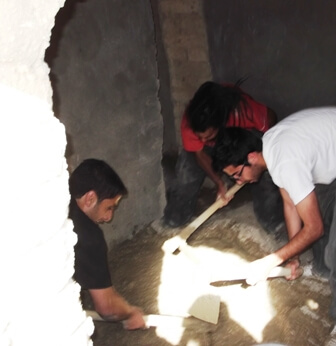 “After the breakfast, during which we got to know each other a little bit, we divided into two groups: about half of us went to collect stones and the other half set off to make the concrete floors. Others sat around enjoying their time smoking shisha and singing songs with the local kids. After collecting a few piles of stones the tractor came to pick up the stones and bring them to the community centre. Getting on the tractors trailer was the biggest attraction and we all had a ride.
“After the breakfast, during which we got to know each other a little bit, we divided into two groups: about half of us went to collect stones and the other half set off to make the concrete floors. Others sat around enjoying their time smoking shisha and singing songs with the local kids. After collecting a few piles of stones the tractor came to pick up the stones and bring them to the community centre. Getting on the tractors trailer was the biggest attraction and we all had a ride.
“After the stone collection we went up to the house to see how the cement group was doing. They had been working hard and seemed to have a good system going of filling the wheelbarrow with stones and buckets with sand and water. When all the floors were paved we had lunch.
Then it was time to go again. The group sang a song to thank the village as they walk towards the buses, followed by the local kids.
“We all went to the Friends Meeting House in Jiftlik which has probably never been so full of people. Rashid told us more about the work of Jordan Valley Solidarity.
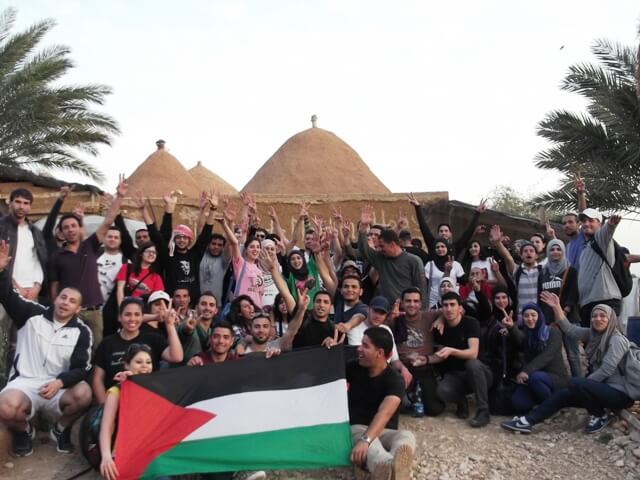 “As we were saying our goodbyes, I got the impression most people had really enjoyed the day. Many of them said they want to come back. When the buses left we felt like we were waving to our new friends. It was a busy and crazy day with a whirlwind of people, but I think everyone enjoyed it and they look back at a good day, in which they have learned a bit more of the situation of many people in the Jordan Valley.
“As we were saying our goodbyes, I got the impression most people had really enjoyed the day. Many of them said they want to come back. When the buses left we felt like we were waving to our new friends. It was a busy and crazy day with a whirlwind of people, but I think everyone enjoyed it and they look back at a good day, in which they have learned a bit more of the situation of many people in the Jordan Valley.
“Thanks everyone for their hard work and good company and Rashid for making it all happen!”
Why Fasayil al Wusta?
Located in-between the settlements of Petza’el and Tomer in area C, the community in Fasay’il al Wusta is prevented from accessing running water or electricity, they are not allowed to tarmac the stony track that is the only road access to their homes, and they have been subjected to the violent destruction of their homes four times since July 2011.
They were issued with widescale demolition orders in March 2011 (http://www.jordanvalleysolidarity.org/index.php/news-2/news2011/363-imminent-house-demolitions-in-fasayal). Then, in June 2011 the Israeli Occuption Forces came to the village and demolished 18 family homes and three animal shelters (http://www.jordanvalleysolidarity.org/index.php/news-2/news2011/342-home-demolitions-in-fasayel).
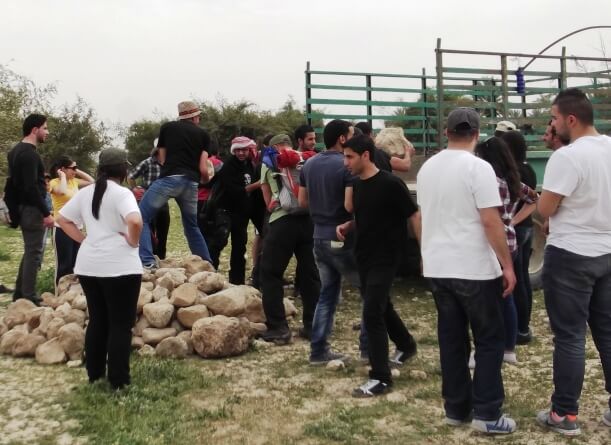 Once again, in December 2011, the IOF returned and destroyed more homes and animal shelters (http://www.jordanvalleysolidarity.org/index.php/news-2/news2011/59-demolitions-in-ffasayil-al-wusta-201211), asnd then again in March 2012 (http://www.jordanvalleysolidarity.org/index.php/news-2/news2012/513-more-home-demolitions-in-fasayil-al-wusta), and again in May 2012 (http://www.jordanvalleysolidarity.org/index.php/news-2/news2012/550-iof-destroying-homes-in-fasayil-al-wusta).
Once again, in December 2011, the IOF returned and destroyed more homes and animal shelters (http://www.jordanvalleysolidarity.org/index.php/news-2/news2011/59-demolitions-in-ffasayil-al-wusta-201211), asnd then again in March 2012 (http://www.jordanvalleysolidarity.org/index.php/news-2/news2012/513-more-home-demolitions-in-fasayil-al-wusta), and again in May 2012 (http://www.jordanvalleysolidarity.org/index.php/news-2/news2012/550-iof-destroying-homes-in-fasayil-al-wusta).
In November 2012, the Israeli Occupation Forces issued new directions to members of the community in Fasay’il al Wusta – this time they are threatened not only with demolition of their homes but with eviction. In order to resist this forcible displacement, members of the community now want to build more homes to stay on their land.
The land around the village has been taken by the nearby settlements of Tomer and Petza’el, or declared Closed Military Zones. This systematically prevents the community from earning a livihood by herding their sheep. In July 2012 an 11 year old boy named Rami Mohammed Al Jediya was seriously injured by a cluster bomb whilst tending his family’s sheep (http://www.jordanvalleysolidarity.org/index.php/news-2/news2013/640-cluster-bombs-left-over-from-israeli-military-training).
Then, in October 2012 63 sheep were poisoned when they ate bread left out for them to find near Petza’el settlement (http://www.jordanvalleysolidarity.org/index.php/news-2/news2012/583-sixty-three-sheep-poisoned-near-peza-el-settlement).
Through all of this repression the community have been determined to stay on their land, and have worked closely with Jordan Valley Solidarity to maintan their right to live there by building community resources and planting trees on their land.
Background Information on Fasayil
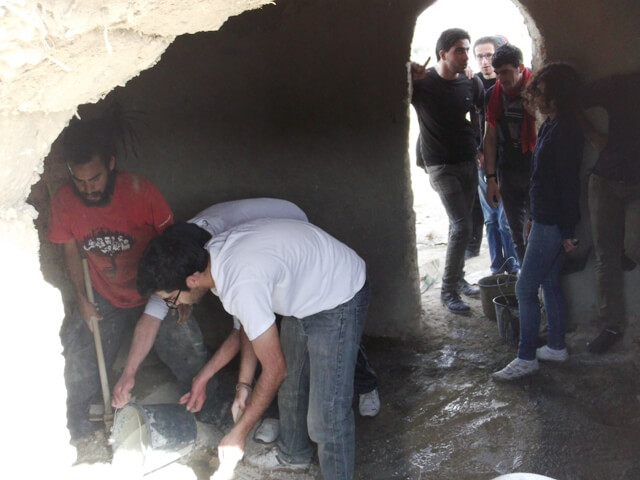 Fasayil is a Palestinian village located in the south of the Jordan Valley. The village was divided in to 3 parts under the Oslo agreements in 1994 (Fasayil at-Tahta, Fasayil al-Wusta and Fasayil al-Fauqa). It is surrounded by three illegal Israeli agricultural settlements. Tomer settlement was established in 1974, controls 366 dunams (1 dunam = 100 meters sq) of agricultural land and has a population of 282 people. Fa’zael settlement was established 1975 and has stolen the historical name of the village. It controls 214 dunams of agricultural land. Ma’ael Ephraim was one of the first Isreali colonies established in the Jordan Valley and occupies a large area of land on the hill overlooking the village.
Fasayil is a Palestinian village located in the south of the Jordan Valley. The village was divided in to 3 parts under the Oslo agreements in 1994 (Fasayil at-Tahta, Fasayil al-Wusta and Fasayil al-Fauqa). It is surrounded by three illegal Israeli agricultural settlements. Tomer settlement was established in 1974, controls 366 dunams (1 dunam = 100 meters sq) of agricultural land and has a population of 282 people. Fa’zael settlement was established 1975 and has stolen the historical name of the village. It controls 214 dunams of agricultural land. Ma’ael Ephraim was one of the first Isreali colonies established in the Jordan Valley and occupies a large area of land on the hill overlooking the village.
The Israeli government offers an abundance of economic incentives to encourage Israeli and international Jews to relocate to the colonies here. Palestinians from the occupied Jordan Valley (and West Bank) make up the labour workforce and are paid NIS 50 per day (a very low amount) as daily workers with no contracts.
Soil in the Jordan Valley is extremely fertile, is located hundreds of meters below sea level with hot temperatures all year round, and there are large water resources in the area. As a result, it has always been central to food growing in the region. In summary, Israeli settlement make large profits from produce; grown manually by Palestinians, on confiscated Palestinian land and irrigated with stolen Palestinian water.
The main part of the village, Fasayil at-Tahte, was classified as area B under the Oslo accords, meaning the Palestinian Authority has administrative control but Israel retains security control. Palestinians living in area B are permitted to run water and electricity to their homes in addition to having health and education services. Restrictions include prohibiting the community from growing geographically and Mekerot (Israeli state water company) only allows the village 6 cubic meters of water per hour causing severe shortages during hot summer months. Approximately 1300 people live in this part of the village which is recognised as having 80 dunams (1 = 1oo meters sq.) Families grow naturally which should cause the population to grow but occupation policies create difficult social and economic conditions forcing many people to move to larger urban areas.
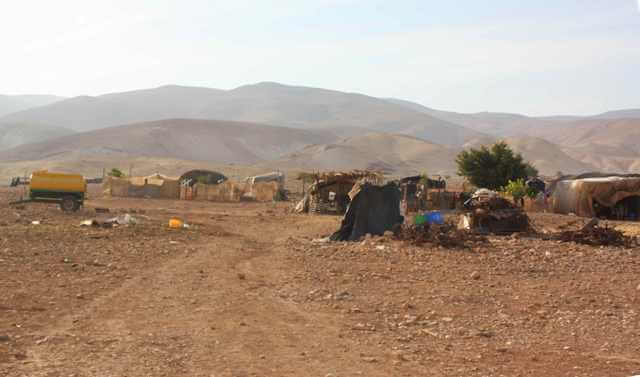 Fasayil al-Fauqa (upper) is located around 3 kilometres to the North, is home to around 700 people and was classified area C under Oslo. Jordan Valley Solidarity participated in a long campaign with the community. In 2007, JVS volunteers and members of the community built a school from mud bricks. Volunteers taught the children until it was recognised and supported by the Palestinian Ministry of Education (who has since paid the teachers’ salaries). The Norwegian representative funded renovation of the school and now 135 children up to the age of 12 receive education in their community. A new kindergarden has now been added at the back and classes are due to start soon. The Belgian government also donated electricity infrastructure to the community which runs from Fasayil at-Tahte (area B) to al-Fauqa (area C). Plastic water pipes were also laid and the community has running water. Many Bedouin tents have been renovated to permanent structures with cement and although the community suffers under occupation, Israel is in negotiations with the PA to give all permanent structures permission to remain. This has only happened because of the determination and resilience of the local community who have established their right to live there through the building of the school and other community projects.
Fasayil al-Fauqa (upper) is located around 3 kilometres to the North, is home to around 700 people and was classified area C under Oslo. Jordan Valley Solidarity participated in a long campaign with the community. In 2007, JVS volunteers and members of the community built a school from mud bricks. Volunteers taught the children until it was recognised and supported by the Palestinian Ministry of Education (who has since paid the teachers’ salaries). The Norwegian representative funded renovation of the school and now 135 children up to the age of 12 receive education in their community. A new kindergarden has now been added at the back and classes are due to start soon. The Belgian government also donated electricity infrastructure to the community which runs from Fasayil at-Tahte (area B) to al-Fauqa (area C). Plastic water pipes were also laid and the community has running water. Many Bedouin tents have been renovated to permanent structures with cement and although the community suffers under occupation, Israel is in negotiations with the PA to give all permanent structures permission to remain. This has only happened because of the determination and resilience of the local community who have established their right to live there through the building of the school and other community projects.
Fasayil al-Wusta is home to around 200 Palestinians and was also classified area C under Oslo. Most of the population work on surrounding agricultural colonies, Tomer (1978) and Fazael (1975). Like most Bedouin, they also rear livestock and some produce cheese. This traditional and sustainable way of life is dependent on the natural resources of the land – mainly water. Fasayil al-Wusta is prohibited from running water or electricity to their homes despite living a few hundred meters from Fasayil at-Tahte which is permitted these basic human rights. Israeli water and electricity infrastructure also passes directly through the community but it is solely for use by the Jewish only settler population.

